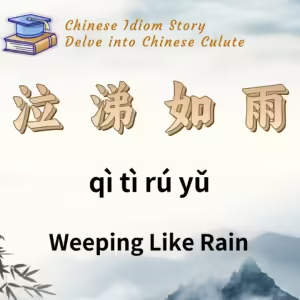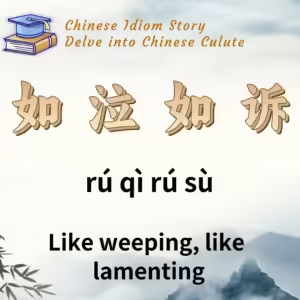
Chinese Idiom: 泣涕如雨 (Qi Ti Ru Yu)
English Translation: Weeping Like Rain
pīn yīn: qì tì rú yǔ
Idiom Meaning: This expression vividly describes extreme sadness, indicating that someone is crying profusely, akin to heavy rain.
Historical Source: Poem Yan Yan (《燕燕》) in the Book of Songs (《诗经》).
Idiom Story:
The poem Yan Yan is a poignant farewell piece often associated with the emotional farewell of a woman leaving her family to get married. It is believed to have been written by a ruler of the State of Wei as he bid farewell to his sister. The poem encapsulates the deep affection and sorrow shared between siblings at the moment of parting.
The text contains four stanzas, with the first three depicting the heart-wrenching scene of the farewell, while the last stanza reflects on the virtues of the bride. Here are key lines from the poem:
- 燕燕于飞,差池其羽。之子于归,远送于野。瞻望弗及,泣涕如雨。
This translates to: “The swallows fly in pairs, fluttering their wings. The daughter is leaving to marry, and she is sent off far into the wilderness. As I gaze and cannot see her, I can’t help but weep like rain.”
The overall sentiment conveys the bittersweet nature of farewells, emphasizing the deep emotional pain of separation. The poet describes the swallows as a metaphor for the couple’s love and the longing felt during the goodbye.
In the final stanza, the poet praises the bride’s character, expressing hope that she will remember her family’s teachings and values as she embarks on this new chapter in her life.
The phrase “泣涕如雨” serves as a powerful reminder of the human experience of love, loss, and the sorrowful moments that accompany significant life transitions. It reflects the cultural emphasis on familial bonds and the emotional weight of parting, making it a commonly used expression to describe profound grief.






